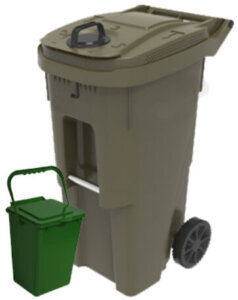Taking out the trash is getting more complicated for some folks in Maryland.
Mandatory organics composting is on the way to the city of Laurel, according to an ordinance approved by the mayor and city council last month. The city says Laurel will be the first municipality to make composting a requirement.
The composting law takes effect on July 1, 2025, leaving plenty of time for residents to get used to the idea and for the city to work out all the kinks on its end. The city said it will step up information and education campaigns to ensure everyone is ready to regularly separate organic waste from their other trash.
City Environmental Programs Manager Michele Blair said the path to this law started four years ago with a composting pilot program.
“We started out with 200 people in 2019. We then grew the program, doubled it and now we’re well into reaching 500 residents,” Blair says.
Right now, the city borders on 30,000 residents and about 7,000 single family and town homes that it will service.

The city will provide homes with a countertop composting bin and a wheeled one for outdoor use. There will be a different container for folks who live in condos and apartments, Blair said.
Compostable items include food waste, scraps, and paper products soiled with food — such as pizza boxes.
“The other things that can go in that people wouldn’t necessarily think about is dryer lint, dog hair can go in there, paper towels,” Blair said while pointing out that paper towels with the Leaping Bunny symbol can be an easy identifier for folks to know which paper towels are OK for composting.
There will be fines for noncompliance, but those will be levied as a last resort, starting at $50 for the first offense, $100 for a second offense, and $150 for subsequent offenses.
But before fines, there will be multiple warnings.
“You will get an ‘oops’ tag. You will get a letter. You will get a door knock,” Blair says, noting that walking residents through the process in person is also an option.
The city is asking residents to consider the future and to think of it now.
“What are we leaving in our wake? What are we leaving for future generations,” Blair asks when discussing the reduction of landfill methane gas emissions. “If people think of that, I don’t think we’ll have any problem,” Blair says.
As for the here and now, one reason for composting comes down to taxpayer dollars.
“Understanding the economics of it is that our tipping fees to landfill our organics is about $70 a ton. To take [those] same organics and bring it to our processing facility is about $25 a ton.”
The waste will still be taken to Maryland Environmental Service for processing.
To learn more about organics recycling in the City of Laurel, check out their website.







